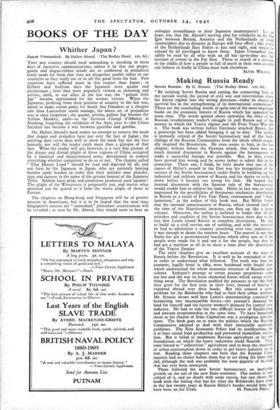Making Russia Ready
Soviet Russia. By E. Strauss. (The Bodley Head. I2S. 6(1.) " By isolating Soviet Russia and cutting the connecting links to the outside world, the period of civil war and intervention drove the Soviet regime into the wrong direction—today its chance of survival lies in the strengthening of its international connexions." These are the concluding words of quite one of the most important books on the economic history of Russia which has appeared for some time. The words quoted above epitomise the story of the Russian revolutionary leader's struggle to pull Russia out of the morass in which the Tsarist regime and the Four Years War left it. The book was written before Germany attacked Russia, but a postscript has been added bringing it up to date. The author is intensely critical of the Soviet bureaucracy and of the back- slidings of the Russian Communists from the ideals which origin. ally inspired the Revolution. He even seems to hint, in the last chapter, written before the German attack, that there was too much internal discontent in Russia against the bureaucracy to make a successful foreign war possible. But, in this, events have proved him wrong and he seems rather to admit this in his postscript. There can, I think, be little doubt that one of the causes of Hitler's assault in the East was his recognition of the success of the Soviet bureaucracy under Stalin in building up the industrial and military power of Russia and his desire to strike it down before it became too strong for him. He hoped that internal discontent with the Spartan rule of the bureaucracy would enable him to achieve his ends. Hitler in fact was as much impressed by the possibilities of fissiparous tendencies developing in Russia as a result of Five Year Plans, rearmament and " Stak- hanovism," as the author of this book was. But Hitler forgot that the national consciousness of Russia, which showed itself at the time of the Napoleonic invasion, can flare up like a latent volcano. Moreover, the author is inclined to forget that all the mistakes and crudities of the Soviet bureaucracy were due to the fact that Lenin found Russia in complete dissolution. He had to build up a civil service out of nothing, and with the material he had to administer a country stretching over two continents; it was enough to daunt the stoutest heart. The marvel is not that Stalin has got a governmental machine which often acts as if the people were made for it and not it for the people, but that lie had got a machine at all in so short a time after the dissolution of the Tsarist Empire. The early chapters give an excellent account of the state of Russia before the Revolution. It is well to be reminded of this in order to understand what followed. The truth was that the peasants, legally freed in 1862, were burdened with feudal dues which undermined the whole economic structure of Russian agri- culture. Stolypin's attempt to create peasant proprietors came too late and the war let loose elemental forces which swept every- thing away. The Revolution enabled the peasants to eat the food they grew for the first time in their lives, instead of having it exported abroad over their heads. But this created a grave problem for the Bolsheviks who had to feed their urban workers. Mr. Strauss shows well how Lenin's statesmanship consisted in harnessing two incompatible forces—the peasant's demand for land for himself and the factory worker's"clemand for control over industry. He had to ride the two difficult horses of Syndicalism and peasant proprietorship at the same time. To have harnessed them to his chariot of State Capitalism was a prodigious achieve- ment. The book goes on to trace the politics which the Russian Communists adopted to deal with their intractable economic problems. The New Economic Policy had its justifications, for it at least raised food production and prevented immediate starva- tion. But it failed to modernise Russian agriculture or lay the foundations on which the heavy industries could flourish. They were forced to " collectivise " agriculture and to keep the standard of urban consumption down in order to get heavy industry on its feet. Reading these chapters one feels that the Russian Com- munists had no choice before them but to act along the lines they did, although the task was probably the most gigantic of its kind that has ever been attempted.
There followed the new Soviet bureaucracy, an inevitable growth on the soil of the new State economy. Our author is very critical of it, and no doubt with some reason, but one closes the book with the feeling that but for what the Bolsheviks have done in the last twenty years in Russia Hitler's hordes would long ago


























 Previous page
Previous page